Is Chai Tea Good for Sore Throat
Chai tea can be a comforting remedy for a sore throat. Often made from a blend of black tea, spices, and milk, chai tea contains several ingredients that may provide relief.
Common spices in chai include ginger, cinnamon, cardamom, cloves, and black pepper. These spices can have anti-inflammatory and soothing properties.
Key Ingredients and Their Benefits
| Ingredient | Potential Benefits |
|---|---|
| Ginger | Anti-inflammatory, soothing |
| Cinnamon | Antimicrobial, reduces irritation |
| Cardamom | Antioxidant, soothing |
| Cloves | Antimicrobial, numbing effect |
| Black Pepper | Enhances absorption of nutrients |
Ginger is known for its anti-inflammatory properties, which may help reduce throat swelling and pain.
Bestsellers
Cinnamon has antimicrobial effects that might help fight off infections. It also adds a warming sensation that can comfort a sore throat.
Cardamom contains antioxidants and can provide a fresh, soothing feel.
Cloves have a mild numbing effect, reducing throat pain and irritation.
Black pepper can support the absorption of other beneficial compounds in chai tea.
How to Prepare Chai Tea for a Sore Throat
- Boil water with chai spices.
- Add black tea and let it steep.
- Sweeten with honey; honey has soothing properties.
- Optionally, add milk or non-dairy alternatives.
Drinking chai tea warm can help soothe throat discomfort while enjoying its flavors. Experimenting with ingredient proportions can enhance the benefits for your sore throat.
Ingredients in Chai Tea
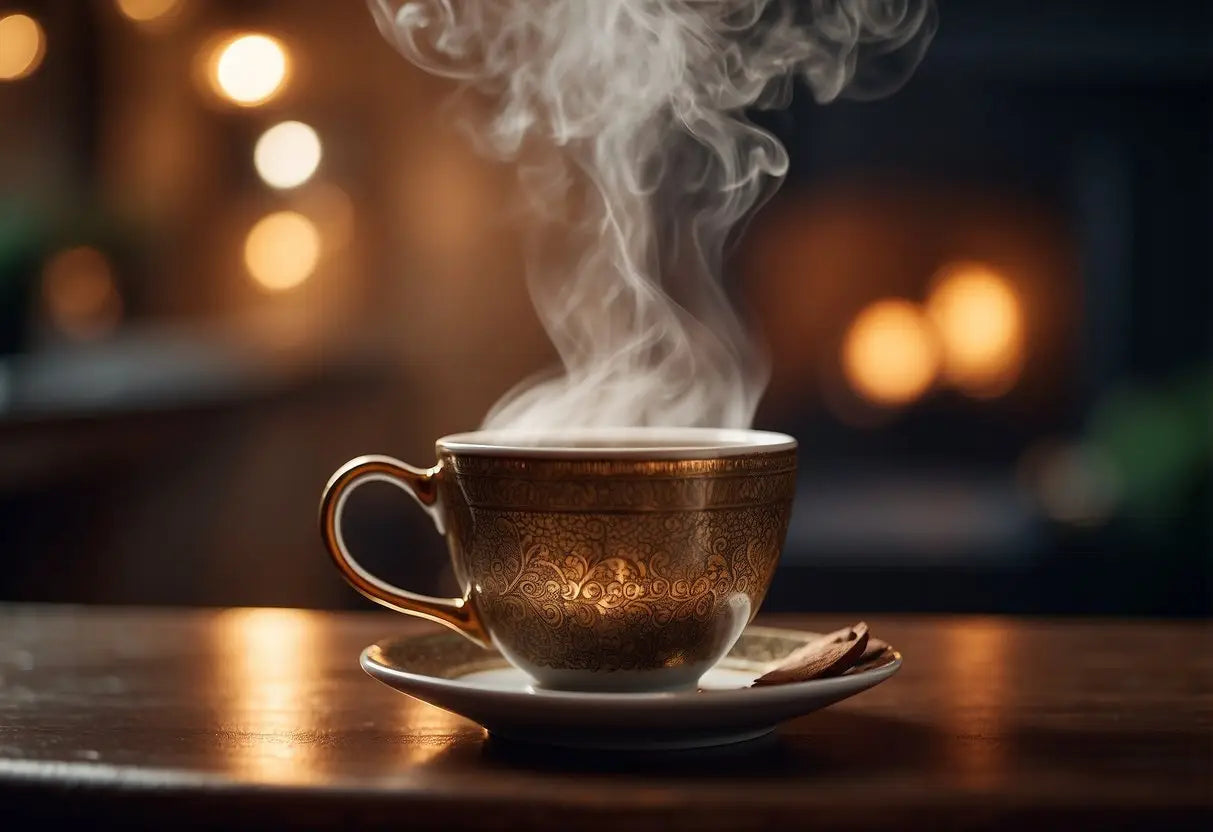
Black Tea
Black tea serves as the base for chai tea. It provides a strong, robust flavor and contains antioxidants, which can be helpful when you're feeling under the weather.
Ginger
Ginger is a common ingredient in chai tea. It has anti-inflammatory properties and can soothe a sore throat.
Cardamom
Cardamom adds a spicy, sweet taste to chai tea. It's known for its antioxidant and anti-inflammatory effects.
Cinnamon
Cinnamon contributes a warm, sweet flavor. It also has antibacterial properties, which can be beneficial when dealing with a sore throat.
Cloves
Cloves introduce a pungent, aromatic flavor. They are rich in antioxidants and can help relieve throat pain.
Black Pepper
Black pepper adds a touch of heat. It enhances the spiciness and also aids in boosting your immune system.
Lao Ban Zhang
Star Anise
Star anise has a licorice-like taste. It contains compounds that can help fight infections.
Milk
Milk or non-dairy alternatives provide creaminess. They also add essential nutrients like calcium and vitamin D.
Sweeteners
Sweeteners such as honey or sugar are often added. Honey, in particular, can help soothe a sore throat.
Optional Ingredients
- Nutmeg: Adds a hint of nutty flavor.
- Vanilla: Provides a subtle sweet taste.
- Fennel Seeds: Adds a licorice-like flavor.
These ingredients combine to create a flavorful and potentially soothing beverage for sore throats.
Benefits of Chai Tea Ingredients for a Sore Throat
Chai tea contains a variety of ingredients that can potentially soothe a sore throat. These include ginger, cinnamon, cloves, cardamom, and black pepper, each of which has unique properties that may help alleviate discomfort.
Ginger
Ginger is well-known for its anti-inflammatory and antibacterial properties. When you consume ginger, it can help reduce inflammation in your throat, providing relief from pain.
1. Anti-inflammatory: Reduces swelling and irritation. 2. Antibacterial: Can help fight off bacteria that might be aggravating the throat.
You may find that ginger's warming sensation offers immediate comfort as well.
Cinnamon
Cinnamon has antimicrobial properties that can aid in fighting the bacteria causing your sore throat. Additionally, its natural sweetness makes it a pleasant addition to chai tea.
1. Antimicrobial: Helps kill bacteria and pathogens. 2. Antioxidant: Provides support to your immune system.
This spice may also help reduce mucus buildup, which can ease your symptoms.
Cloves
Cloves are traditionally used for their numbing effect, which can provide temporary pain relief for a sore throat. They also boast antiseptic properties.
1. Numbing agent: Reduces pain sensations. 2. Antiseptic: Keeps infections at bay.
You may also benefit from cloves' ability to reduce inflammation and fight bacteria.
Cardamom
Cardamom is often included in chai tea for its soothing effects on the throat. It contains compounds that have analgesic and anti-inflammatory properties.
1. Analgesic: Eases pain in the throat. 2. Anti-inflammatory: Reduces swelling and irritation.
This spice can also improve airflow by acting as a natural decongestant.
Black Pepper
Black pepper can help clear mucus that might be causing a sore throat. It also acts as a natural decongestant, making it easier for you to breathe.
1. Mucus clearing: Helps remove mucus from the throat. 2. Decongestant: Opens up nasal passages for easier breathing.
Its anti-inflammatory properties further contribute to relieving throat pain and discomfort.
By incorporating these ingredients, chai tea may offer a multifaceted approach to alleviating the symptoms of a sore throat.
How to Brew Chai Tea for Sore Throat Relief
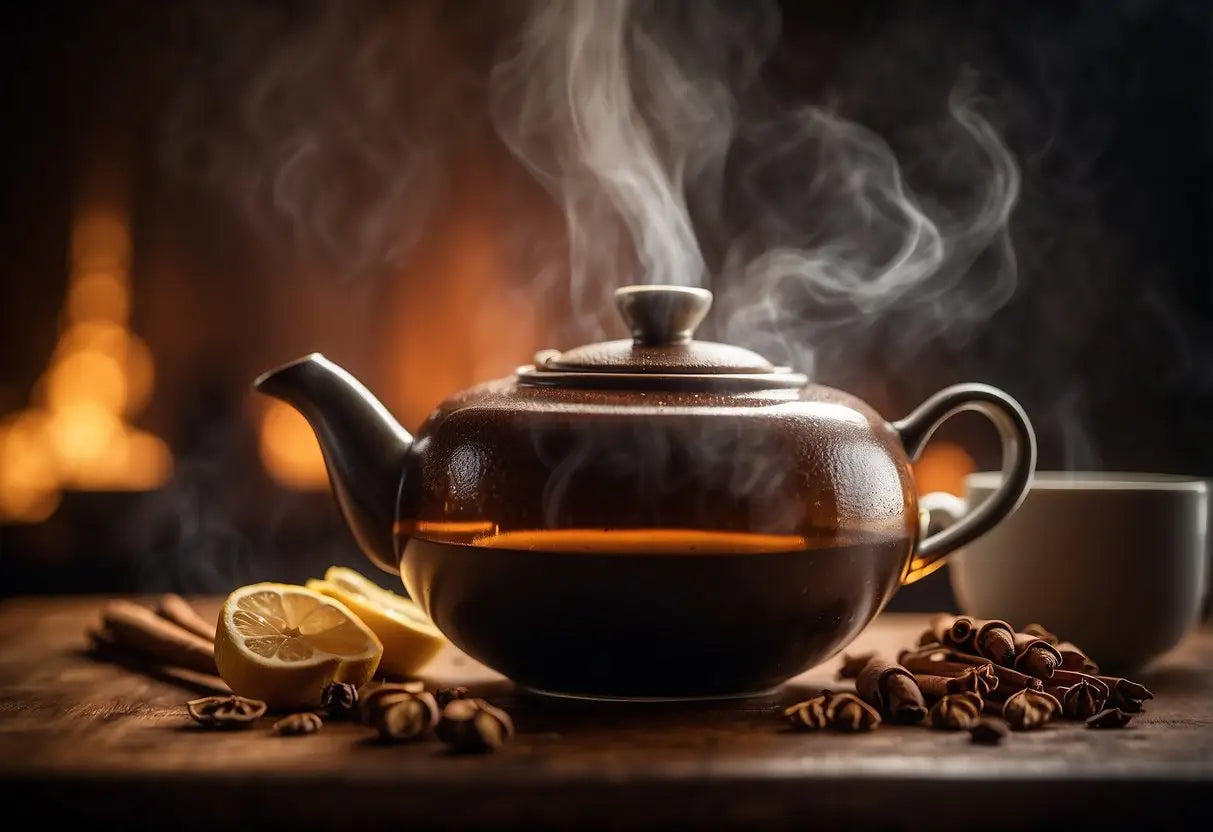
To brew chai tea that can help soothe a sore throat, you will need a few key ingredients.
Ingredients:
- 1 cup water
- 1 cup milk (or a milk substitute)
- 1-2 teaspoons black tea leaves (or 1-2 tea bags)
- 2-3 slices of fresh ginger
- 1 cinnamon stick
- 2-3 cardamom pods
- 3-4 cloves
- 1-2 teaspoons honey
Instructions:
-
Boil Water: Start by boiling 1 cup of water in a pot. Add the fresh ginger slices, cinnamon stick, cardamom pods, and cloves.
-
Simmer Spices: Let the spices simmer for 5-10 minutes to release their flavors.
-
Add Tea: Add the black tea leaves or tea bags and continue to simmer for another 2-3 minutes.
-
Combine with Milk: Pour in 1 cup of milk or milk substitute. Bring the mixture to a gentle boil, then reduce the heat and simmer for another 2-3 minutes.
-
Strain and Sweeten: Strain the tea into a cup, removing the spices and tea leaves. Stir in 1-2 teaspoons of honey.
Enjoy your soothing chai tea!
Comparing Chai Tea with Other Sore Throat Remedies
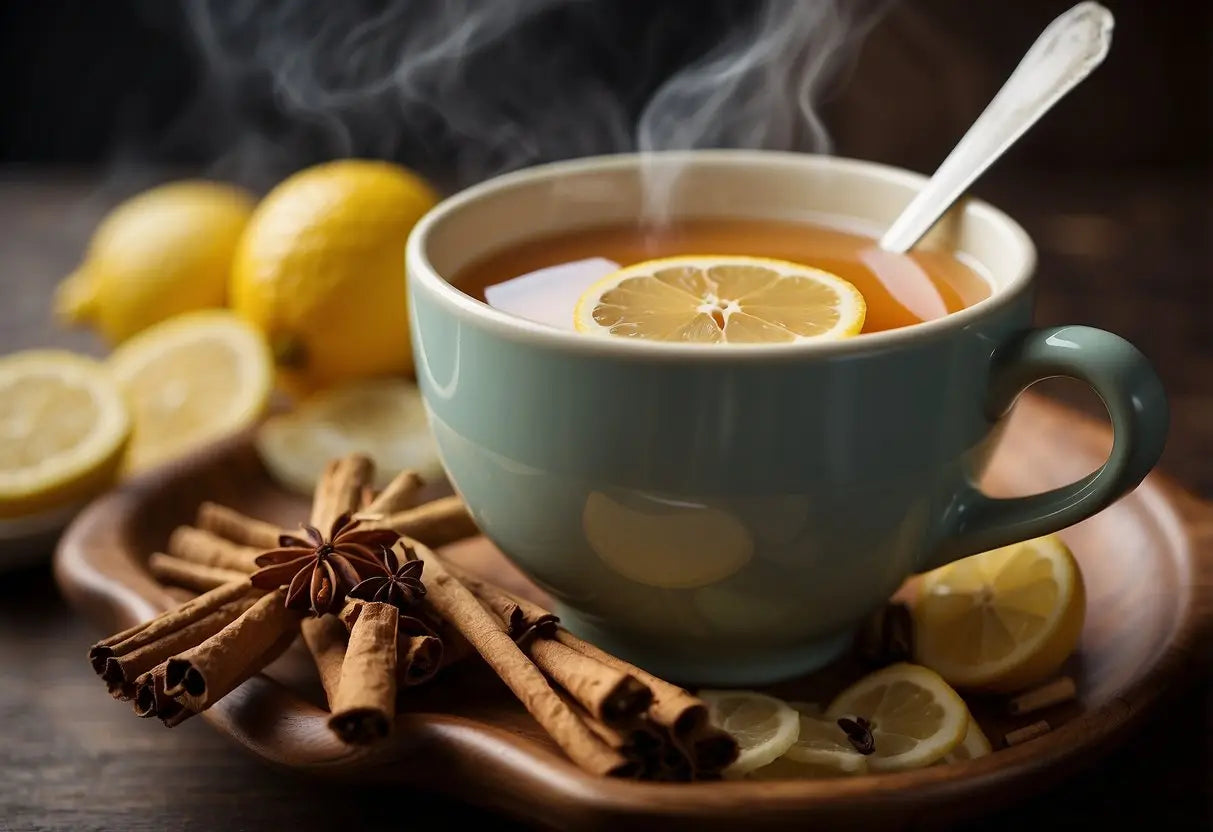
When comparing chai tea to honey and lemon, both options soothe the throat. Chai tea's spices add warmth and relief, while honey and lemon provide antibacterial benefits.
Gargling with salt water is a staple remedy. It reduces inflammation and kills bacteria, but lacks the comforting warmth of chai.
| Remedy | Benefits | Drawbacks |
|---|---|---|
| Chai Tea | Warming, soothing, anti-inflammatory spices | Contains caffeine if not using an herbal blend |
| Honey and Lemon | Antibacterial, soothing | High in sugar |
| Salt Water Gargle | Reduces inflammation, kills bacteria | Unpleasant taste for some |
Cough drops and lozenges ease symptoms too. They often contain menthol which numbs the throat but can't match the soothing experience of a warm beverage.
Herbal teas like peppermint or ginger also rate highly. They offer similar soothing effects but with different flavor profiles and medicinal properties compared to chai.
| Herbal Tea | Benefits | Drawbacks |
|---|---|---|
| Peppermint | Cooling, helps with congestion | May be too intense for some |
| Ginger | Anti-inflammatory, aids digestion | Strong taste not for everyone |
Chai tea holds its own against other remedies, blending warmth and beneficial spices in a comforting drink. It's effective while offering a pleasant drinking experience.
Potential Side Effects of Chai Tea
Drinking chai tea may have side effects due to its ingredients.
Caffeine Sensitivity:
Chai tea contains black tea, which has caffeine. If you are sensitive to caffeine, you might experience jitteriness or trouble sleeping.
Digestive Issues:
Spices like ginger and cinnamon in chai tea can cause digestive discomfort for some people. This includes gas or stomach cramps.
Allergic Reactions:
Ingredients like cardamom or cloves can cause allergic reactions. Symptoms might include itching, swelling, or trouble breathing.
Blood Sugar Levels:
Chai tea often has added sugar. High sugar intake can affect blood sugar levels, which is a concern if you have diabetes.
Interactions with Medications:
Certain spices in chai tea can interact with medications. For example, ginger can affect blood thinners, altering their effectiveness.
Iron Absorption:
Tannins in black tea can inhibit iron absorption. If you have low iron levels, this might be a concern for you.
Summary Table
| Side Effect | Possible Causes | Symptoms |
|---|---|---|
| Caffeine Sensitivity | Black tea (caffeine content) | Jitteriness, trouble sleeping |
| Digestive Issues | Ginger, cinnamon | Gas, stomach cramps |
| Allergic Reactions | Cardamom, cloves | Itching, swelling, trouble breathing |
| Blood Sugar Levels | Added sugar | Fluctuations in blood sugar levels |
| Medication Interactions | Ginger (among others) | Altered effectiveness of medications |
| Iron Absorption | Tannins in black tea | Reduced iron absorption |
Always consult with a healthcare professional if you experience any adverse effects after drinking chai tea.
When to Drink Chai Tea for Sore Throat
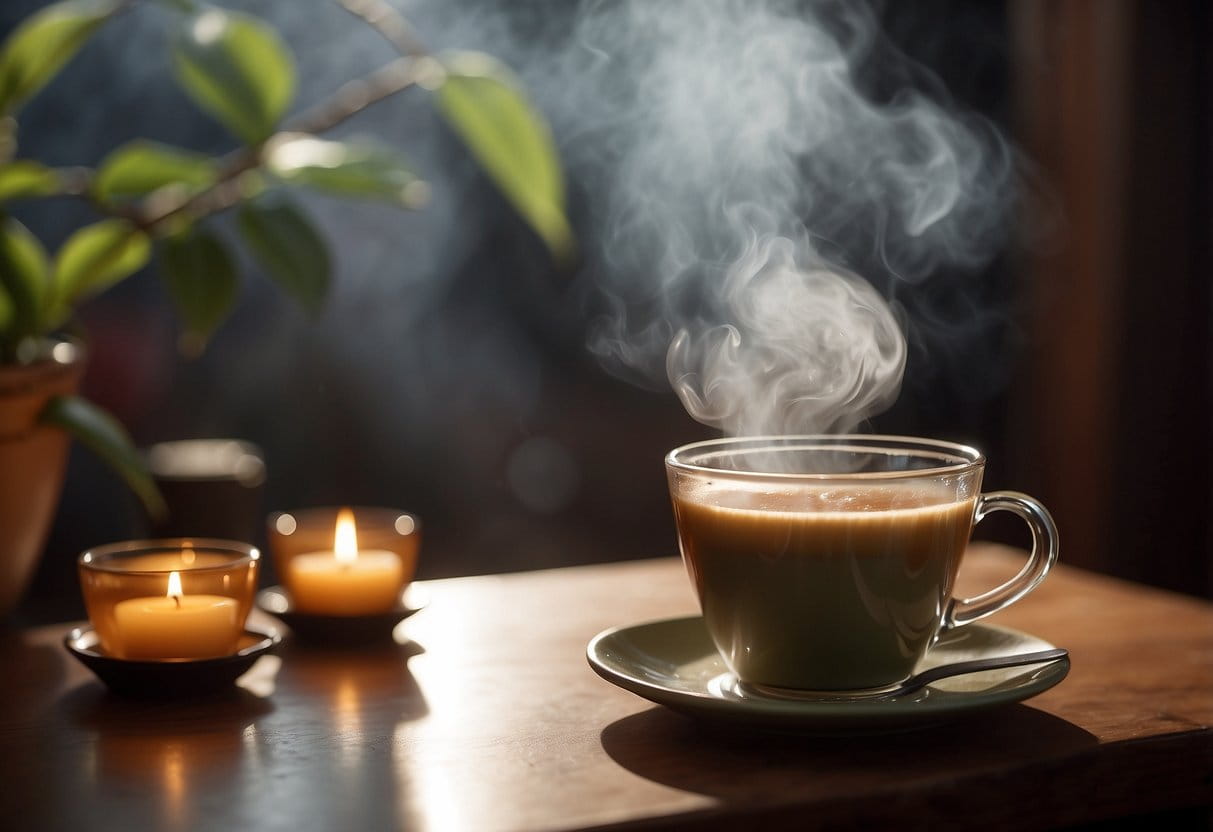
You can drink chai tea throughout the day to alleviate a sore throat.
Morning: Start your day with a warm cup to soothe your throat and alleviate morning discomfort.
Afternoon: A mid-day cup can help keep your throat moist and provide continued relief.
Evening: Drinking chai tea before bed can help ease nighttime throat irritation.
Specific Times
- After Waking Up: Helps clear mucus and soothes irritation.
- After Meals: Assists in digestion and relieves throat pain.
- Before Bed: Promotes relaxation and reduces throat discomfort.
Tips for Optimal Benefits
- Use warm, not hot tea to prevent further irritation.
- Add honey for additional soothing properties.
- Drink slowly to maximize the tea's coating effect on your throat.
Recommended Chai Tea Recipes for Sore Throat

You can make soothing chai tea with easily accessible ingredients. Here are some recommendations.
Classic Ginger Chai
- Boil 1 cup of water with 1 tsp of grated ginger.
- Add 1 tsp of black tea leaves.
- Simmer for 5-7 minutes.
- Strain and add 1-2 tsp of honey.
Turmeric Chai
- Boil 1 cup of milk with 1/2 tsp of turmeric powder.
- Add 1 tsp of chai tea blend.
- Simmer for 5 minutes.
- Strain and add 1 tsp of honey and a pinch of black pepper.
Lemon and Honey Chai
- Boil 1 cup of water with 1 tsp of chai spices.
- Add 1 tsp of tea leaves.
- Simmer for 5 minutes and strain.
- Add 1 tbsp of lemon juice and 1-2 tsp of honey.
These recipes can help soothe your sore throat. Each ingredient has potential benefits. Try different combinations to find what works best for you. Stay hydrated and rest for better recovery.
Chai Tea and Hydration
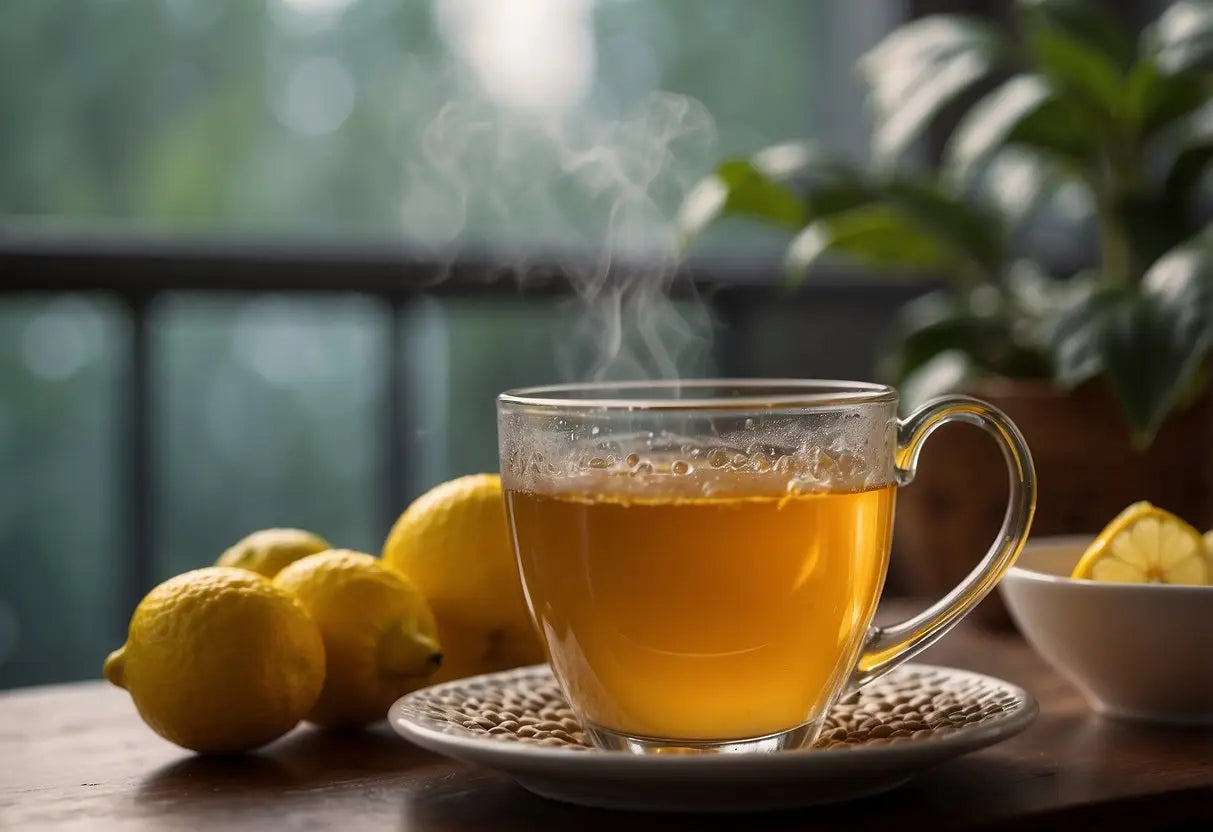
Chai tea can contribute to your daily fluid intake. Consuming fluids is essential when you have a sore throat, as it helps keep your throat moist and alleviates irritation.
Chai tea includes various ingredients, such as black tea, spices, and milk. Black tea provides hydration, although it contains caffeine, which can have a mild diuretic effect. Despite this, the amount of caffeine in chai is generally not significant enough to cause dehydration.
Consider the following points for hydration benefits:
- Water Content: A cup of chai tea contains mostly water, contributing to your fluid intake.
- Milk Option: Adding milk, whether dairy or plant-based, can add to the hydrating properties while providing additional nutrients.
- Spices: Ingredients like ginger and cinnamon do not detract from the hydrating qualities.
| Ingredient | Hydration Impact |
|---|---|
| Black Tea | Positive, with mild diuretic effect |
| Milk | Adds fluid and nutrients |
| Spices | Neutral, no negative impact |
Pay attention to the temperature. Warm chai tea can be soothing and help relieve throat discomfort.
Opt for decaffeinated chai tea if you are concerned about caffeine intake. This is especially useful if you're drinking multiple cups a day.
Precautions and Considerations
When drinking chai tea for a sore throat, consider potential allergens. Ingredients like cinnamon or cardamom may cause allergic reactions in some individuals.
Be aware of the caffeine content. Chai typically contains black tea, which has caffeine that may not be suitable for everyone, especially before bedtime.
If you are on medication, consult your healthcare provider. Certain spices and herbs in chai tea might interact with medications.
Monitor your symptoms. If your sore throat persists or worsens after drinking chai tea, you should seek medical advice.
Those with sensitive stomachs should consume chai tea cautiously. Spices like ginger and black pepper can sometimes cause stomach discomfort.
For individuals with diabetes, consider how much sweetener you add to your chai tea, as it may affect blood sugar levels.
Pregnant women should avoid excessive consumption. Some chai spices may not be recommended during pregnancy.
Allergens in Chai Tea
| Ingredient | Potential Allergen |
|---|---|
| Cinnamon | Possible allergen |
| Cardamom | Possible allergen |
| Ginger | Generally safe |
| Black Pepper | Generally safe |
Note: Always check ingredient lists if you're prone to allergies.
← Older post Newer post →











